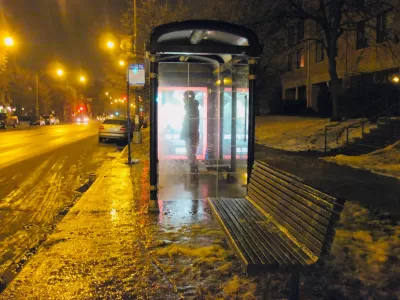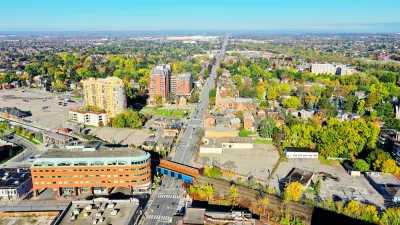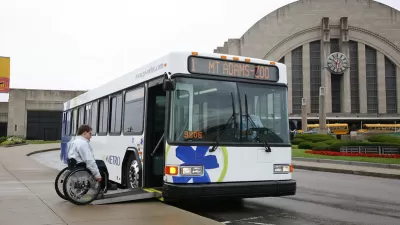Urban light rail has enjoyed a renaissance since the Great Recession, but during the same period cities have quietly reduced bus service. Daniel Hertz argues that while rail is commendable, buses remain a vital transit component.

High-profile transit projects are exciting, but because of their sexiness the dependable and unglamorous city bus may be getting short shrift.
Since the 2008 recession, "Light rail in particular has continued its decade-plus boom, with a service increase of more than 12% in just two years. By contrast, bus service – which already took a heavier hit in the first years of the recession – was cut an additional 5.8%."
Hertz argues that demand for buses has not dropped. In fact, he finds no real correlation between dips in ridership and subsequent service cuts.
The bus decline may have more to do with political demographics: "Even though more people take buses than trains in nearly every metropolitan area in the country, train riders, on average, tend to be wealthier and whiter [...] In other words, rail tends to have a more politically powerful constituency behind it than buses."
"There are serious equity issues with shifting resources from bus to rail – again, not because of anything inherent to those technologies, but simply because of who happens to use them in modern American cities."
For a response to the arguments of Hertz's article, see a Planetizen blog post by Michael Lewyn citing examples of light rail systems that add bus riders, rather than cannibalizing them.
FULL STORY: Urban residents aren’t abandoning buses; buses are abandoning them

Maui's Vacation Rental Debate Turns Ugly
Verbal attacks, misinformation campaigns and fistfights plague a high-stakes debate to convert thousands of vacation rentals into long-term housing.

Planetizen Federal Action Tracker
A weekly monitor of how Trump’s orders and actions are impacting planners and planning in America.

In Urban Planning, AI Prompting Could be the New Design Thinking
Creativity has long been key to great urban design. What if we see AI as our new creative partner?

Massachusetts Budget Helps Close MBTA Budget Gap
The budget signed by Gov. Maura Healey includes $470 million in MBTA funding for the next fiscal year.

Milwaukee Launches Vision Zero Plan
Seven years after the city signed its Complete Streets Policy, the city is doubling down on its efforts to eliminate traffic deaths.

Portland Raises Parking Fees to Pay for Street Maintenance
The city is struggling to bridge a massive budget gap at the Bureau of Transportation, which largely depleted its reserves during the Civd-19 pandemic.
Urban Design for Planners 1: Software Tools
This six-course series explores essential urban design concepts using open source software and equips planners with the tools they need to participate fully in the urban design process.
Planning for Universal Design
Learn the tools for implementing Universal Design in planning regulations.
Gallatin County Department of Planning & Community Development
Heyer Gruel & Associates PA
JM Goldson LLC
City of Camden Redevelopment Agency
City of Astoria
Transportation Research & Education Center (TREC) at Portland State University
Jefferson Parish Government
Camden Redevelopment Agency
City of Claremont





























